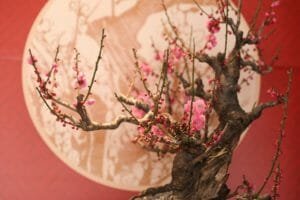1 Longjing Tea (龙井茶 lóng jǐng chá)
龙井茶 lóng jǐng chá is a variety of green tea known for its delicate flavor and fragrant aroma, which is said to be reminiscent of chestnuts or orch. 龙井茶 lóng jǐng chá is also known as Dragonwell tea. It is a type of green tea that is grown in the Longjing Village near Hangzhou in China.
2 Tie Guan Yin Tea (铁观音茶 tiě guān yīn chá)
铁观音茶 tiě guān yīn chá is a type of oolong tea from the Anxi region of Fujian province in China. Its name means “Iron Goddess of Mercy,” It has a sweet and floral flavor.
3 Da Hong Pao Tea (大红袍茶 dà hóng páo chá)
大红袍茶 dà hóng páo chá is an oolong tea from the Wuyi Mountains in Fujian, China. It is one of the most expensive teas in the world and is known for its strong, roasted taste.
4 Bai Hao Yinzhen Tea (白毫银针茶 bái háo yín zhēn chá)
白毫银针茶 bái háo yín zhēn chá, also known as Silver Needle tea, is a type of white tea from Fujian China. It is made from the buds of the tea plant and has a light and delicate flavor.

5 Huangshan Maofeng Tea (黄山毛峰茶 huáng shān máo fēng chá)
黄山毛峰茶 huáng shān máo fēng chá is a green tea from the Huangshan Mountains in Anhui province in China. Its name means “Yellow Mountain Fur Peak,” and it has a delicate and floral flavor.
6 Keemun Black Tea (祁门红茶 qí mén hóng chá)
祁门红茶 qí mén hóng chá is a type of black tea from Qimen county in Anhui province in China. It has a floral and fruity flavor and is often used in blends for English Breakfast tea.
7 Shui Xian Oolong Tea (水仙乌龙茶 shuǐ xiān wū lóng chá)
水仙乌龙茶 shuǐ xiān wū lóng chá is a type of oolong tea that comes from the Wuyi Mountains in Fujian province in China. Its name means “Water Sprite” and has a rich, smoky flavor.
8 Pu-erh tea (普洱茶 pǔ ěr chá)
普洱茶 pǔ ěr chá is a type of fermented tea that comes from the Yunnan province in China. 普洱茶 pǔ ěr chá is a fermented tea that is known for its unique flavor and health benefits. It is made by aging and fermenting the tea leaves, which creates a dark, rich taste and a smooth, earthy aroma. Pu-erh tea is often sold in compressed cakes or bricks, and it can be aged for many years to improve its flavor.










